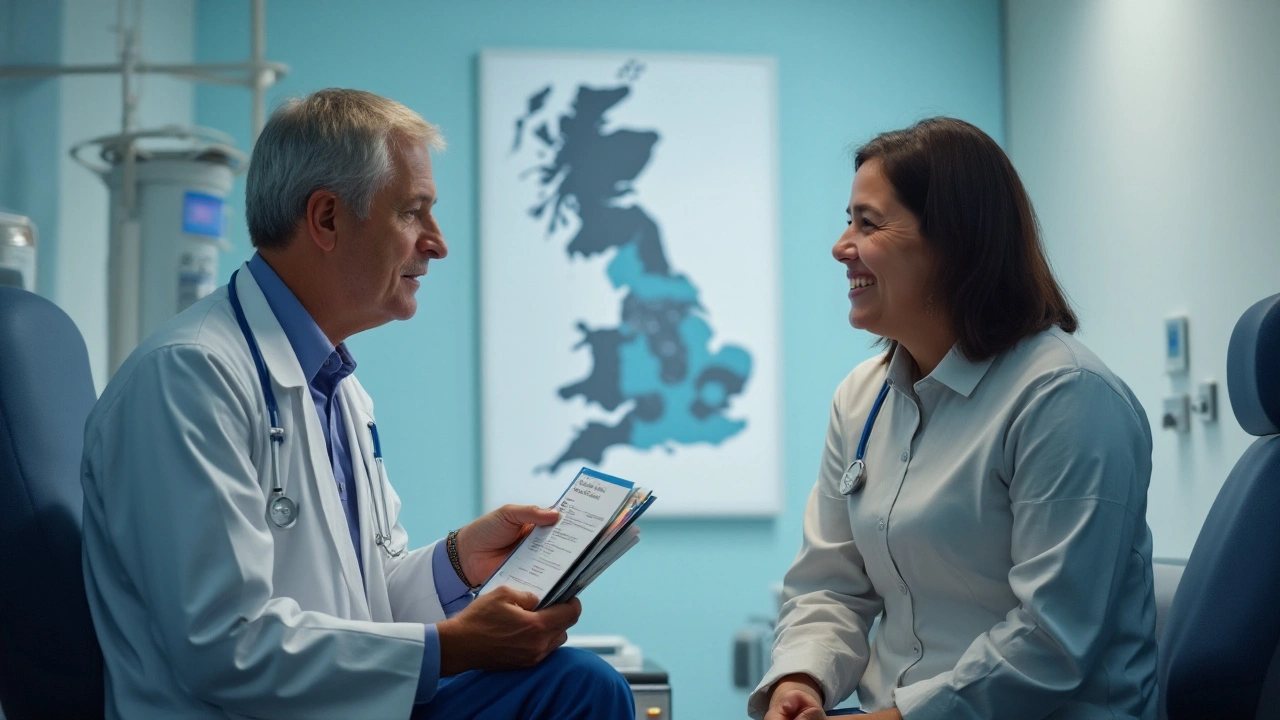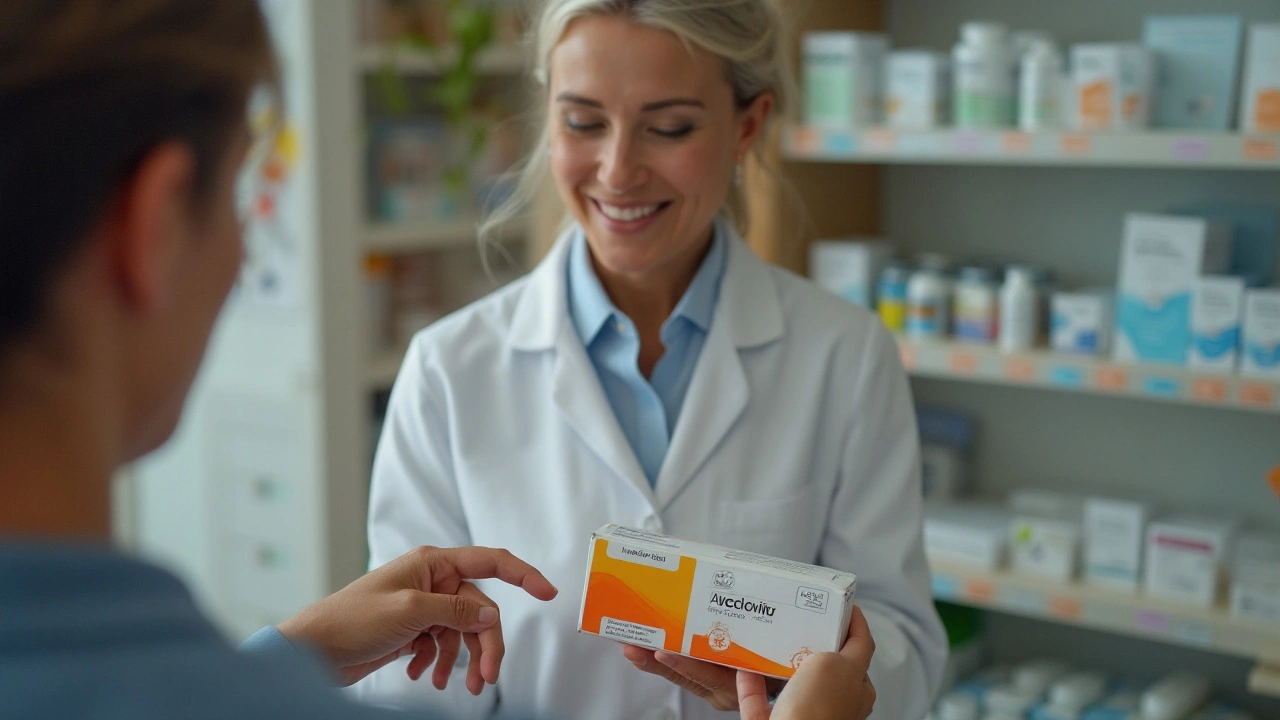Exploring alternatives to Valtrex can be essential for those seeking different approaches to managing herpes infections. Each alternative antiviral medication brings its own set of features, benefits, and considerations. From oral therapies with varying efficacies to topical creams that offer immediate relief, understanding the nuances can help tailor the best treatment for individual needs.
Acyclovir
The quest for effective herpes management often leads individuals to the doorstep of Acyclovir. This antiviral medication has gained a solid reputation for treating infections caused by the herpes simplex virus, tackling ailments like genital herpes, cold sores, and shingles with impressive zeal. It functions by inhibiting the virus's ability to replicate itself, effectively curbing the intensity and duration of symptoms. Although Valtrex is more bioavailable, Acyclovir's versatility in forms, including oral, topical, and even intravenous, offers patients varied application methods tailored to different needs.
Acyclovir is often praised for its good tolerability among users. Most patients experience minimal side effects, making it a go-to choice for many. However, it does have its quirks. The medication's lower bioavailability compared to valacyclovir requires more frequent dosing. This can be a hassle for those with busy lifestyles who may struggle to remember multiple doses each day. In terms of side effects, some users report mild gastrointestinal disturbances such as nausea or diarrhea, but these are typically manageable.
On the bright side, Acyclovir's history is rich with success stories. Back in 1993, Dr. Gertrude B. Elion, a researcher for whom dedication knew no bounds, shared in a
Nobel Prize acceptance speech, "Acyclovir stands for the hope of patients worldwide who battle herpes every day." Her groundbreaking work paved the way for the development and accessibility of antivirals that provided much-needed relief for countless individuals.
Moreover, the drug's expansive availability across different formulations ensures that it is accessible to a wide range of patients. From creams that swiftly tackle cold sores to intravenous preparations used in hospital settings, the breadth of its applications reflects its importance in the fight against viral infections. This accessibility, both geographically and financially, makes Acyclovir an appealing alternative to Valtrex for many patients globally.
In therapeutic settings, it continues to provide reliable efficacy, which remains pivotal in both the treatment and prevention of recurrent herpes episodes. Its established track record woven through decades of clinical use offers a comforting reliability for those seeking an alternative that doesn't compromise on proven results. Given these factors, Acyclovir stands tall as a cornerstone in the realm of antiviral Valtrex alternatives, keeping hope alive for those it serves.
Famciclovir
Famciclovir emerges as a compelling alternative to Valtrex owing to its noteworthy attributes in managing herpes simplex virus infections. Famciclovir is particularly celebrated for its enhanced oral bioavailability. This means that when you take it orally, your body is capable of absorbing more of the active drug compared to some other alternatives like acyclovir. This factor allows for potentially lower dosages, making it a more convenient option for many users who may struggle with strict dosing schedules. This aspect often improves patient adherence, providing an edge in ensuring effective treatment outcomes.
Interestingly, Famciclovir has been considered beneficial for immunocompromised patients, offering an important line of defense against outbreaks. For someone with a weakened immune system, having an antiviral that reliably prevents the virus from replicating is crucial. It's employed in the treatment of shingles (herpes zoster) as well as the suppression of recurrent episodes of genital herpes, highlighting its versatility across different manifestations of the herpes virus. It's also intriguing to know that this medication functions as a prodrug of penciclovir, meaning it converts into penciclovir in the body to combat the infection. This conversion is crucial because penciclovir directly inhibits the viral DNA replication, slowing down the virus's ability to spread and cause symptoms.
"Famciclovir has changed the way we manage herpes zoster outbreaks in vulnerable populations," commented Dr. Laura Chen, a leading virologist. "Its effectiveness and bioavailability have allowed for more tailored, patient-friendly treatments without compromising potency."
The safety profile of Famciclovir is generally favorable, with reported side effects often on the milder end of the spectrum. However, like any medication, it isn't without its drawbacks. Gastrointestinal disturbances such as nausea and diarrhea can occur, although these are less frequently reported. Another practical concern lies in its reduced popularity among prescribers, making it slightly less accessible compared to options like Acyclovir or valacyclovir. For this reason, those considering Famciclovir should ideally consult with a healthcare provider to ensure that it aligns well with their personal health profile and to evaluate this alongside any current medications.
Deciding whether to opt for Famciclovir over other antiviral solutions should involve consideration of several factors, ranging from the severity and location of the infection to personal circumstances like existing health conditions and lifestyle. Clinicians often look beyond clinical efficacy, weighing patient-specific elements to guide treatment plans. Notably, Famciclovir does not entail the same level of complex metabolic interactions as some more potent antivirals, simplifying its use for those who may be taking a range of medications for comorbid conditions. This makes it a generally accessible option for long-term management of chronic outbreaks.

Valganciclovir
Valganciclovir emerges as a potent antiviral medication primarily embraced in the medical world for its effectiveness against cytomegalovirus (CMV) infections. This drug is particularly notable among patients who are immunocompromised, such as those who have undergone organ transplants. Its biochemical design allows it to convert in the body into ganciclovir, which effectively blocks the virus from spreading. Given the gravity of CMV infections in immunosuppressed individuals, valganciclovir has become a crucial player in the prophylactic management to prevent diseases that could complicate patient recovery after transplants.
This oral medication is often preferred in medical protocols due to its ease of administration compared to intravenous alternatives. It supports convenient dosing, making it favorable for long-term outpatient care. Despite its benefits, it is vital to understand that valganciclovir is not indicated for treating herpes simplex virus infections, which distinguishes it significantly from options like Acyclovir and Famciclovir. Knowing this difference can guide both healthcare providers and patients in choosing the appropriate treatment depending on the viral cause and patient conditions.
Interestingly, the broader therapy landscape for CMV has evolved with several clinical studies continually supporting valganciclovir's efficacy. It sustains its role as a first-line treatment for maintaining long-term control over CMV. However, balancing its therapeutic potential with the risk of side effects remains critical. Commonly reported adverse effects include neutropenia and thrombocytopenia, which require ongoing monitoring of blood counts and patient symptoms. As with many medications that carry a risk of side effects, the strategic use of valganciclovir requires experienced clinical judgment to maximize its benefits while minimizing harm.
According to Dr. Milton Halvorsen, an infectious disease specialist, "Valganciclovir bridges a crucial gap in the management of CMV within vulnerable populations. It empowers us to keep viral burdens at bay as we focus on the holistic healing process." This reflects the medical community's appreciation of its role. Physicians must weigh factors such as the patient's overall health status and specific medical needs when opting for valganciclovir as a treatment solution. The duality of its powerful antiviral action and potential side effects underscores the importance of personalized medicine in contemporary healthcare practices.
Navigating its place in a comprehensive treatment plan is often a process of ongoing assessment and reaction to changing health metrics. While strategic, its application should be meticulously paired with other therapies when required to address symptoms holistically. Valganciclovir symbolizes the critical nature of targeted therapies in modern medicine, where antiviral interventions are not merely about treating the disease but also protecting the long-term health of patients who face increased risks from complex, opportunistic infections.
Penciclovir
When we talk about Penciclovir, we're diving into one of the alternatives that stands distinctively in the world of topical treatments for cold sores brought on by the herpes simplex virus. Penciclovir is essentially a powerhouse when it comes to managing these pesky sores. Being available mainly as a topical cream, it's designed for swift action to combat the HSV-1 virus which causes cold sores around the mouth and lips. What's noteworthy about Penciclovir is its ability to relieve symptoms faster. With its regular application, studies have shown that it can reduce healing time significantly. This is particularly appealing to individuals who need a quick fix before an important event or simply want to clear up their cold sore without too much delay.
One key aspect that makes Penciclovir widely preferred is its targeted application. By applying the cream directly onto the sore, the medication gets to work immediately at the site of infection, significantly reducing the chance of systemic side effects, which are often a concern with oral antiviral medications. Users appreciate this targeted approach, as it not only mitigates discomfort but also helps minimize the embarrassment that often accompanies visible sores. According to a publication in the Journal of Antimicrobial Chemotherapy, "Penciclovir cream is recognized for its efficacy and safety in cold sore patients, yielding better outcomes in terms of faster symptom resolution and improved quality of life." Its targeted action means fewer potential interactions with other medications or bodily systems, giving users peace of mind while treating their condition.
Despite its localized effectiveness, it’s important to highlight that Penciclovir is not intended for systemic viral infections. This limits its use exclusively to treating lesions on the surface of the skin. However, for those specifically battling cold sores, this focused approach is precisely what they need. The cream itself can be applied multiple times a day, approximately every two hours while awake, leading to a beneficial routine that actively reduces the presence of the virus with each application. Patients are often advised to initiate treatment at the very first sign of a cold sore, usually tingling, swelling, or redness, as this can greatly enhance its efficacy.
An added advantage is the relatively mild nature of its side effects, with skin irritation being the most common, yet still infrequent complaint. This means that for the majority of users, Penciclovir offers a comfortable course of treatment that can fit easily into their daily routine without significant interruptions. The statistics from dermatological studies underscore this, showing a high satisfaction rate among users who experience less recurrence of cold sores with timely use. Due to these factors, Penciclovir remains an essential option in the arsenal against cold sores, offering a focused, effective treatment that promotes rapid healing and user satisfaction.
Penciclovir cream is recognized for its efficacy and safety in cold sore patients, yielding better outcomes in terms of faster symptom resolution and improved quality of life.

Docosanol
Docosanol is a popular over-the-counter topical cream used for treating cold sores, which are caused by the herpes simplex virus. It works by inhibiting the fusion of the virus with the host cell, effectively preventing the virus from spreading. This unique mode of action makes it an appealing option for many who experience cold sores, primarily because it offers a non-prescription alternative to more traditional antiviral medications. Those who begin treatment at the first sign of a cold sore outbreak often find it quite effective in reducing the duration of symptoms.
One of the key advantages of Docosanol is its accessibility; being available without a prescription allows individuals to manage their symptoms promptly. This can be especially beneficial considering the often painful and embarrassing nature of cold sores. According to some studies, applying Docosanol at the onset of symptoms can shorten healing time significantly, sometimes shaving off days from a typical outbreak.
"Docosanol has proven to be a valuable option for many patients dealing with cold sores, offering both convenience and effectiveness," states Dr. Emily Chiu, a noted dermatologist.
However, while Docosanol is quite effective for treating cold sores, it is not suitable for systemic infections. The cream is limited to topical application, meaning it won't address any internal virus activity or other types of herpes infections such as genital herpes or shingles. Some users might experience mild skin irritation, which is a common side effect shared by many topical medications. Nevertheless, its benefits, combined with the quick relief it can provide, make it a staple in many medicine cabinets around the world.
A practical tip for using Docosanol is to apply it as soon as the first tingle or redness appears. Consistent application every four hours during waking hours is recommended for the best results. Despite being user-friendly, it's crucial to follow the usage instructions precisely to avoid any less-than-desirable outcomes. While not every case of cold sores can be entirely prevented, handling outbreaks effectively can significantly improve one's quality of life.
As sales figures have shown, Docosanol remains a top choice among non-prescription treatments for cold sores. Its ease of use, coupled with its accessibility, underscores its universal appeal. Here’s a quick glance at its position among over-the-counter treatments:
| Product | Market Share (%) |
|---|---|
| Docosanol (Abreva) | 45 |
| Lysine Supplements | 25 |
| Other Topicals | 30 |
The simplicity of using a cream for such a pervasive issue has undoubtedly contributed to its widespread use. So for anyone who frequently deals with cold sores, keeping a tube of Docosanol handy might just be the smart move.
Conclusion
Choosing the best antiviral medication can feel like a daunting task, especially when faced with an array of Valtrex alternatives. Each option we've explored—Acyclovir, Famciclovir, Valganciclovir, Penciclovir, and Docosanol—provides unique ways to tackle the herpes virus, whether it's in the form of cold sores, genital herpes, or more serious conditions requiring specific treatments like CMV infections. Understanding the nuances among these medications is crucial in making an informed decision.
Considering the specific needs of a patient is often pivotal. For those who require a medication available in various formats, Acyclovir comes to the rescue, albeit with the caveat of more frequent dosing, which may be a minor inconvenience to some. Meanwhile, Famciclovir offers the perk of better oral bioavailability, ensuring more efficient absorption by those who take it. Interestingly, it is less frequently chosen, despite its merits.
"Medicine is not only a science; it is also an art. It does not consist of compounding pills and plasters; it deals with the very processes of life, which must be understood before they may be guided," remarked Paracelsus, highlighting the intricate balance in medical treatments.
For specific circumstances involving immune system challenges, Valganciclovir steps in as a specialized antiviral solution, particularly apt for managing CMV. While it holds great promise for patients who need it, it doesn’t cross over to common herpes infections, unlike Penciclovir, which is incredibly effective against cold sores through its topical application. However, the convenience of Penciclovir’s topical use is balanced by its limited systemic reach, speaking to its targeted efficiency. Equally as effective in the topical domain is Docosanol, prized for its over-the-counter accessibility, though its role is confined to treating cold sores, not systemic herpes infections.
Comparative Overview
| Alternative | Form | Primary Use | Main Advantage |
|---|---|---|---|
| Acyclovir | Oral, Topical, IV | Herpes Simplex | Diverse Forms |
| Famciclovir | Oral | Herpes Simplex | Better Bioavailability |
| Valganciclovir | Oral | CMV in Immunocompromised | Effective for CMV |
| Penciclovir | Topical | Cold Sores | Quick Relief |
| Docosanol | Topical | Cold Sores | OTC Availability |
The decision between these options often rests on personal medical history, the specific strain of infection, and individual lifestyle factors. It's essential to weigh the advantages and potential drawbacks as discussed. Consulting with healthcare professionals to tailor the most suitable approach enhances not only treatment outcomes but also patient confidence. As medical science progresses, so too do the treatment possibilities. Each of these alternatives to Valtrex can serve as a vital tool in the broader arsenal against herpes-related symptoms and complications, underscoring the diversified strategies available today.



peter richardson
Acyclovir works fine but the dosing schedule is a nightmare. I had to set six alarms a day just to keep up. Valtrex was way easier even if it cost more. Why make life harder?
Also why is everyone ignoring the fact that some of these drugs are just repackaged versions of the same thing?